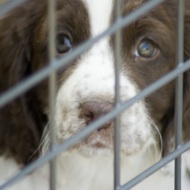
Defra figures show dramatic climb in imports from some countries
Dog imports into the UK have risen dramatically in recent years, according to figures released by Defra.
Commercial imports of dogs from EU countries rose from 1,869 in 2013, to 25,912 in 2015. The number of dogs imported into the UK for non-commercial reasons under the Pet Travel Scheme rose by nearly 13,000 in the same period.
The RSPCA has raised particular concern over the steep incline in dogs imported from Ireland, Lithuania, Hungary, Poland and Romania - all of which are linked with large scale puppy farming operations.
According to Defra's figures, over 33,000 dogs were imported from these countries for commercial and non-commercial reasons last year, compared to less than 14,000 in 2013 (though figures were not included for Romania and Lithuania in 2013).
Defra minister of state George Eustice released the figures last week in response to a written question from Jim Fitzpatrick, MP for Poplar and Limehouse.
Mr Eustice said the majority of pets entering the country have UK passports, suggesting they are returning to the country with their owners after a holiday or trip abroad. However, he added that the data is collated by a range of third parties, generally transport companies, therefore it is not possible for the government to guarantee the accuracy of the statistics.
Pet imports have been a source of rising unease since the Pet Travel Scheme (PETS) was relaxed in 2012, allowing dogs, cats and ferrets to enter the UK without quarantine assuming they meet certain conditions.
Many veterinary organisations, animal charities and even Trading Standards have voiced concerns about the increased threat of imported disease - namely rabies - though Defra maintains that the threat is very low.
These fears have only been fuelled by recent undercover work carried out by the Dogs Trust. An exposé last year revealed widespread abuse of the Pet Travel Scheme by criminal groups in Lithuania and Hungary.
Since then, the charity managed to smuggle a toy dog into the UK with a fake passport and microchip on three out of four attempts.
The RSPCA said it was "appalled" by the recent import figures, which it feels shows the "shocking scale of this problem". The charity is urging the government to take action by improving border checks and increasing accountability and monitoring of breeders.
Responding to the charity, a spokesperson for Defra said: "The UK Government is committed to cracking down on animal traffickers and putting a stop to the abhorrent illegal trade of puppies or abuses of the EU Pet Travel Scheme.
"The UK has one of the toughest pet border checking regimes in the EU. Every pet dog travelling to Britain on an approved route has its microchip and passport checked. We also carry out additional random checks which helps to ensure puppies are properly vaccinated and are old enough to travel.
"We are working with Dogs Trust and Kent County Council to facilitate the rehoming of underage dogs abandoned in quarantine at Dover Port and Eurotunnel."



 The veterinary mental health charity Vetlife is inviting the veterinary community to join it for a sponsored cold-water dip.
The veterinary mental health charity Vetlife is inviting the veterinary community to join it for a sponsored cold-water dip.